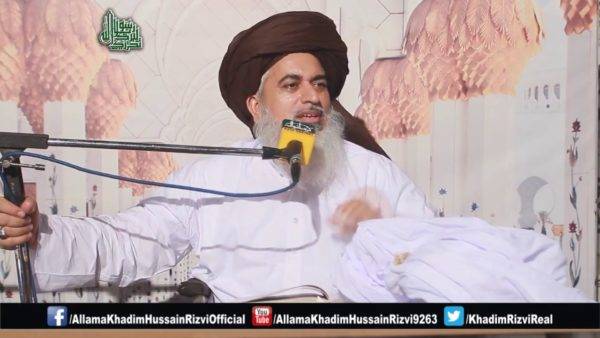
Some built a shrine in his memory and others collected money in his name. Some extolled him and sought more divine rewards. But Khadim Hussain Rizvi, chairman of Tehrik-e-Labaik Ya Rasool (TLYR), best capitalized on Mumtaz Qadri to build a narrative that translated into material gains.
After Qadri’s sentence was carried out, Rizvi toured the country to build his support base. The agenda was not confined to Qadri, however. Rizvi’s aim was to replace other politico-religious parties whose political clout had been rusting over the years.
The by-election in NA-120 Lahore proved that Rizvi had eclipsed the once-strong and vociferous Jamaat-e-Islami. First, he tried to have his party registered as Tehreek-i-Labbaik Pakistan (TLP). Another group that came to prominence was the Hafiz Saeed-led Milli Muslim League. Both failed to register with the Election Commission of Pakistan. Nonetheless, they fielded independent candidates and managed to bag more than 10,000 votes—far more than the Jamaat or Pakistan People’s Party.
“They hit the jackpot,” commented Azeem Chaudhry, a journalist-turned politician from NA-120. “Space for Khadim Hussain and like-minded clerics was already available after the death of Shah Ahmed Noorani.” According to him, the Sunni Tehrik had tried to capture the so-called Barelvi vote in the past, but had badly failed. “Rizvi managed to lure a large number of voters given the circumstances and general perception about the Nawaz Sharif family vis-à-vis Mumtaz Qadri.”
With political ambition in mind, Rizvi also launched coordinated attack against his contemporaries including Sirajul Haq of the JI and Fazlur Rehman of the Jamiat Ulema-e-Islam-F and Sajid Mir of Jamaat Ahle Hadith. “Leaders of religious parties in Parliament have a history of hypocrisy vis-à-vis Khatam-e-Nabuwat laws,” declared Rizvi, while speaking to journalists last month. “However, TYL will not allow anyone to make any change in these laws.”
Rizvi seized the opportunity when Parliament sought to amend the election laws to allow former Prime Minister Nawaz Sharif to legally head his political party. Rizvi threatened to march towards Islamabad. His dharna lasted for 20 days, in which life was brought to a virtual standstill in the twin cities.
After a “successful” protest, Rizvi returned home a hero. The former grade-11 clerk from the Auqaf department was now a household name.
Shahzad Raza is an Islamabad-based journalist @OldPakistan_
After Qadri’s sentence was carried out, Rizvi toured the country to build his support base. The agenda was not confined to Qadri, however. Rizvi’s aim was to replace other politico-religious parties whose political clout had been rusting over the years.
The by-election in NA-120 Lahore proved that Rizvi had eclipsed the once-strong and vociferous Jamaat-e-Islami. First, he tried to have his party registered as Tehreek-i-Labbaik Pakistan (TLP). Another group that came to prominence was the Hafiz Saeed-led Milli Muslim League. Both failed to register with the Election Commission of Pakistan. Nonetheless, they fielded independent candidates and managed to bag more than 10,000 votes—far more than the Jamaat or Pakistan People’s Party.
“They hit the jackpot,” commented Azeem Chaudhry, a journalist-turned politician from NA-120. “Space for Khadim Hussain and like-minded clerics was already available after the death of Shah Ahmed Noorani.” According to him, the Sunni Tehrik had tried to capture the so-called Barelvi vote in the past, but had badly failed. “Rizvi managed to lure a large number of voters given the circumstances and general perception about the Nawaz Sharif family vis-à-vis Mumtaz Qadri.”
With political ambition in mind, Rizvi also launched coordinated attack against his contemporaries including Sirajul Haq of the JI and Fazlur Rehman of the Jamiat Ulema-e-Islam-F and Sajid Mir of Jamaat Ahle Hadith. “Leaders of religious parties in Parliament have a history of hypocrisy vis-à-vis Khatam-e-Nabuwat laws,” declared Rizvi, while speaking to journalists last month. “However, TYL will not allow anyone to make any change in these laws.”
Rizvi seized the opportunity when Parliament sought to amend the election laws to allow former Prime Minister Nawaz Sharif to legally head his political party. Rizvi threatened to march towards Islamabad. His dharna lasted for 20 days, in which life was brought to a virtual standstill in the twin cities.
After a “successful” protest, Rizvi returned home a hero. The former grade-11 clerk from the Auqaf department was now a household name.
Shahzad Raza is an Islamabad-based journalist @OldPakistan_

